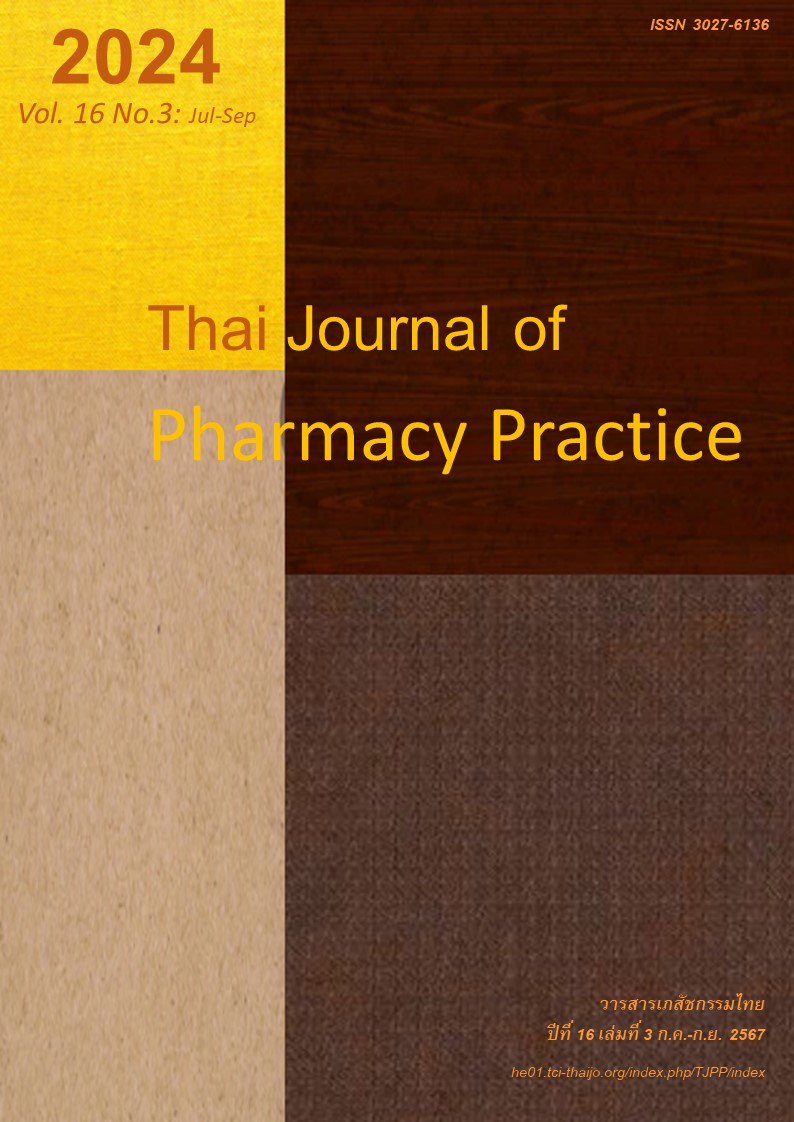Factors Affecting Medication Adherence of Hypertensive Patients at Huai-Sat-Yai Tambon Health Promoting Hospital, Hua-Hin District, Prachuabkhirikhan
Main Article Content
Abstract
Objective: To determine factors affecting medication adherence among hypertensive patients at Huai-Sat-Yai Tambon health-promoting hospital, Hua-Hin District, Prachuabkhirikhan. Methods: This research was a cross-sectional study in all hypertensive patients receiving cares at Huai-Sat-Yai Tambon health-promoting hospital in August 2021. Medication adherence was assessed using the Medication Adherence Scale in Thais (MAST©). Patient's stress was measured by the SPST-20 (Suanprung Stress Test 20). Knowledge of diseases and drugs and social support were assessed using a questionnaire developed by the researcher from a review of the literature. The study employed binary logistic regression to predict medication adherence with the following independent variables- sex, age, education, occupation, blood pressure control, comorbidities, duration of disease, stress, knowledge on the disease and medications and social support. Results: A total of 79 hypertensive outpatients participated in this study with mean age of 65.56±10.99 years, 75.95% being female and a mean duration of disease of 7.68±4.12 years. 79.75% of the subjects were unable to control blood pressure. Their average knowledge score was 11.47±2.22 (out of 15). The average social support score was 20.11±4.73 (out of 25). The average stress score was 25.34±4.62 (out of 100). The mean score on medication adherence was 36.10±4.02 points (from a full score of 40). 78.5% of patients had an adequate level of medication adherence. Male hypertensive patients were 8.6 times more likely to have adequate medication adherence than females, which was statistically significant (95% CI of OR or odds ratio = 1.02-72.48; P = 0.048). A unit increase in hypertension knowledge score was associated with a 1.35-fold increase in the likelihood of adequate medication adherence (95%CI of OR = 1.02-1.77; P = 0.034). The analysis found pseudo R2 at 0.12 (P=0.007). Conclusion: Patients with hypertension in Huai-Sat-Yai Tambon health-promoting hospital, Hua-Hin District, Prachuabkhirikhan who were male and having higher knowledge scores were more likely to have better medication adherence than females and those with lower scores.
Article Details

This work is licensed under a Creative Commons Attribution-NonCommercial-NoDerivatives 4.0 International License.
ผลการวิจัยและความคิดเห็นที่ปรากฏในบทความถือเป็นความคิดเห็นและอยู่ในความรับผิดชอบของผู้นิพนธ์ มิใช่ความเห็นหรือความรับผิดชอบของกองบรรณาธิการ หรือคณะเภสัชศาสตร์ มหาวิทยาลัยสงขลานครินทร์ ทั้งนี้ไม่รวมความผิดพลาดอันเกิดจากการพิมพ์ บทความที่ได้รับการเผยแพร่โดยวารสารเภสัชกรรมไทยถือเป็นสิทธิ์ของวารสารฯ
References
Division of Non-communicable Diseases. Number and mortality rate with 5 NCD 2016–2020 [online]. 2021 [cited Aug 20, 2021].Available from: www.thai ncd.com/2016/mission/documents-detail.php?id=14 480&tid=32&gid=1-020.
Thai Hypertension Society. 2019 Thai guidelines on the treatment of hypertension [online]. 2019 [cited Aug 20, 2021].Available from: http://www.thaihyper tension.org/guideline.html
Uchmanowicz B, Chudiak A, Uchmanowicz I, Rosińc zuk J, Froelicher ES. Factors influencing adherence to treatment in older adults with hypertension. Clin Interv Aging 2018; 13: 2425–41.
Bunyatnopparat K, Limpawattana P. Factor associated with medication adherence in older patients with chronic diseases of Dongluang hospital. KKU Journal of Medcine 2019; 5: 40-9.
Puanglai K, Jarupaktranonth C, Changsirikulchai S, Janma J, Chuemongkon W. Stress and medication adherence among continuous ambulatory peritoneal dialysis patients. Srinagarind Medical Journal 2020; 35: 287–95.
Jitautai W. Factors influencing medication adherence in hypertensive patients without complications [master thesis]. Chonburi; Burapha University; 2021.
Mahatnirunkul S, Pumpaisalchai W, Tapanya P. The construction of Suanprung stress test for Thai population. Academic Psychiatry and Psychology Journal 1997; 13: 1-20.
Suphachamroon A, Lerkiatbundit S, Saengcharoen W. Validity and reliability of the medication adherence scale in Thais. Thai Journal of Pharmacy Practice 2018; 10: 607–19.
Jongwilaikasem K, Lerkiatbundit S. Development of the medication adherence scale for Thais (MAST). Thai Journal of Pharmacy Practice. 2021; 13: 17–30.
Puengdokmai P, Charoenkitkarn V, Pinyopasakul W, Sriprasong S, Dumavibhat C. Factors influencing medication adherence in hypertensive patients without complications. Princess of Naradhiwas University Journal 2016; 8: 16–26.
Rungsawang S. Factors related to polypharmacy medication adherence among older persons with chronic illness. Journal of Nursing, Siam University 2017; 18: 6–23.
Ernawati I, Lubada EI, Lusiyani R, Prasetya RA. Association of adherence measured by self-reported pill count with achieved blood pressure level in hypertension patients: a cross-sectional study. Clin Hypertens 2022; 28: 12. doi: 10.1186/s40885-022-00195-5.
Choi HY, Oh IJ, Lee JA, Lim J, Kim YS, Jeon TH, et al. Factors affecting adherence to antihyperten sive medication. Korean J Fam Med. 2018; 39: 325–32.
Pattanajak C. Medication adherence in elderly patients with chronic disease at Lad Pattana Health promoting hospital, Muang District, Mahasarakham province. Mahasarakham Hospital Journal. 2019; 16: 13–22.
Panthonglang W, Namphonkrang P, Duangsanjan W.Factors influencing the health behavior of uncontrolled hypertension patients. Songklanagarind Journal of Nursing 2018; 38: 152–65.


